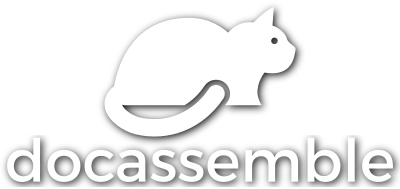
Docassemble
A free, open-source expert system for guided interviews and document assembly, based on Python, YAML, and Markdown.

A free, open-source expert system for guided interviews and document assembly, based on Python, YAML, and Markdown.
docassemble is a free, open-source expert system for guided interviews and document assembly. It provides a web site that conducts interviews with users. Based on the information gathered, the interviews can present users with documents in PDF, RTF, or DOCX format, which users can download or e-mail.
Though the name emphasizes the document assembly feature, docassemble interviews do not need to assemble a document; they might submit an application, direct the user to other resources on the internet, store user input, interact with APIs, or simply provide the user with information.
docassemble was created by a lawyer/computer programmer for purposes of automating the practice of law, but it is a general-purpose platform that can find applications in a variety of fields.

Compose your templates in .docx (with help of a Word Add-in) or .pdf files. Synchronize files with your server using Google Drive, OneDrive, or a command-line utility.

Send text messages to your users or use the SMS interface as an alternative to the web interface.

Develop applications that involve more than one user, such as mediation or counseling interviews.

Protect user information with server-side encryption, two-factor authentication, document redaction, and other security features.
Interviews are developed as YAML files. Within the YAML files, the text of the interview questions and documents is formatted with Markdown, and the logic of the interview flow is expressed with if/then/else statements in Python.
question: |
What is your favorite number?
fields:
Favorite number: best_number
datatype: number
---
question: |
% if best_number == 42:
That's **my** favorite number!
% else:
What a _lousy_ favorite number.
% endif
mandatory: TrueYAML is a text format for expressing information in a way that is both human-readable and machine readable.
food: bread
ingredients:
- flour
- yeast
- water
- saltMarkdown is a text format for expressing typographical formatting. For example, if you write this Markdown text:
It is *very* important that you obtain your
[free credit report](https://www.annualcreditreport.com) as soon
as possible.then you get text that looks like this:
It is very important that you obtain your free credit report as soon as possible.
Python is a language designed to be readable and easy to learn. Interview developers do not need to have any prior experience with Python or computer programming in order to create docassemble interviews. The only Python statements developers may need to write are if/then/else statements that are very close to plain English. For example:
if user.is_citizen or user.is_legal_permanent_resident:
user.is_eligible = True
else:
user.is_eligible = FalseAlthough docassemble has extensive documentation, you may have questions about how to use it. To get help from the community of developers and other users, you can chat in real time with knowledgeable developers on the docassemble Slack group. If you find a bug, you can submit an issue on GitHub.
Interview developers do not have to design the “flow” of the interview; docassemble will automatically determine what questions to ask, and the order in which to ask them, based on what information is necessary to gather. The system will refrain from asking unnecessary questions. For example, if the interview contains a conditional statement such as:
if user.is_disabled or user.age > 60:
special_funding_exists = True
else:
special_funding_exists = Falsethen the user will be asked if he is disabled, and will only be asked
for his age if he says he is not disabled. Developers need to provide a
question for every variable (e.g., there need to be questions that
determine user.is_disabled and user.age) but docassemble will
automatically figure out when and whether to ask those questions.
This allows developers to concentrate on the end result rather than worrying about how to construct the interview process. Developers who are lawyers can “practice at the top of their license” by spending their time thinking about the law (a lawyer function) rather than thinking about the interview process (a non-lawyer function).
Though this automatic interview flow is a powerful feature, sometimes interview developers have a particular preference about the order of questions. docassemble allows them to use the automatic system as much or as little as they want; if they want to dictate a specific order of questions, they can do so.
Designed and built by Jonathan Pyle
Code licensed under
MIT,
documentation under CC BY 3.0.